Past simple : употребляется для выражения

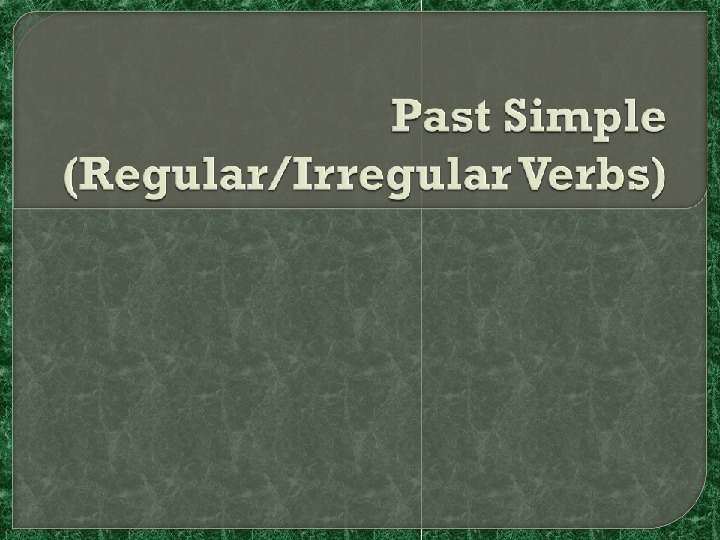
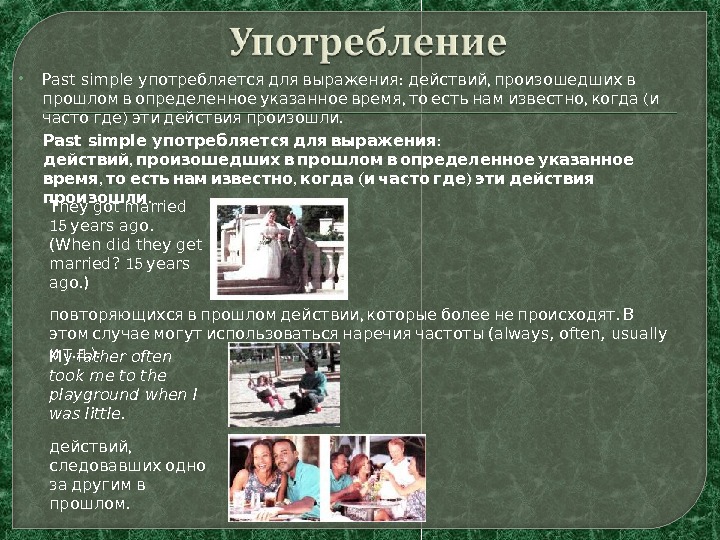
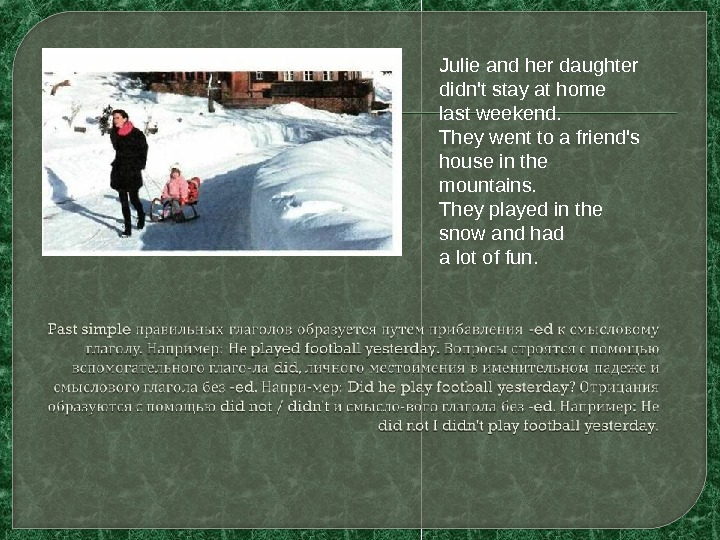
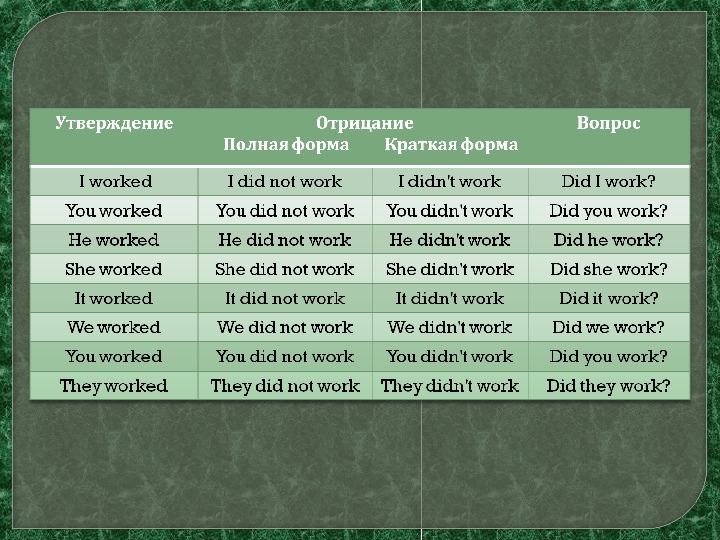
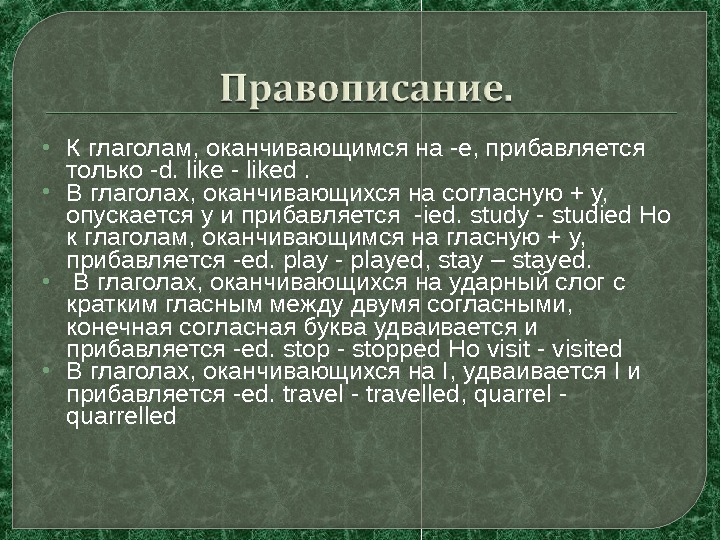
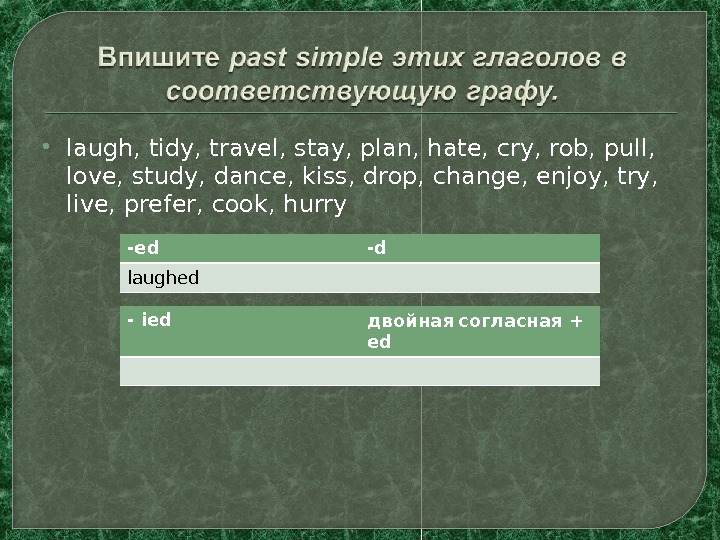
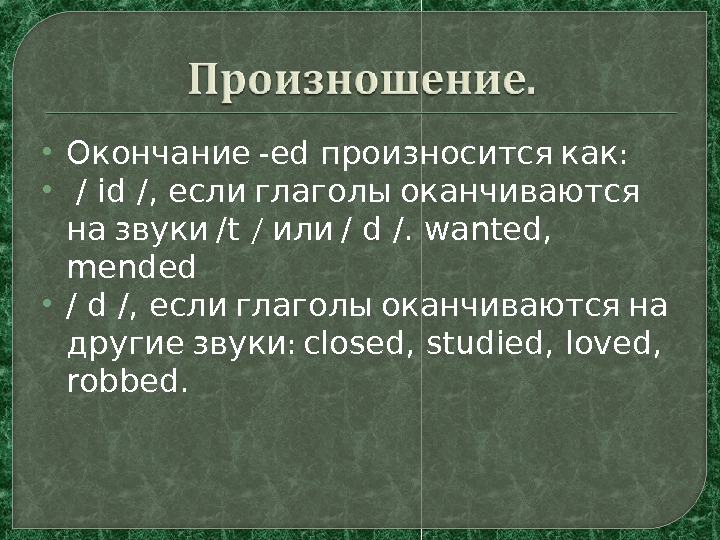
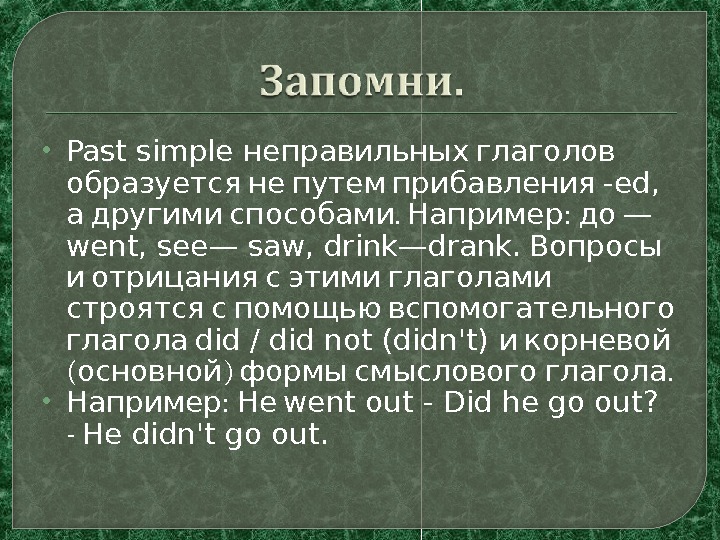
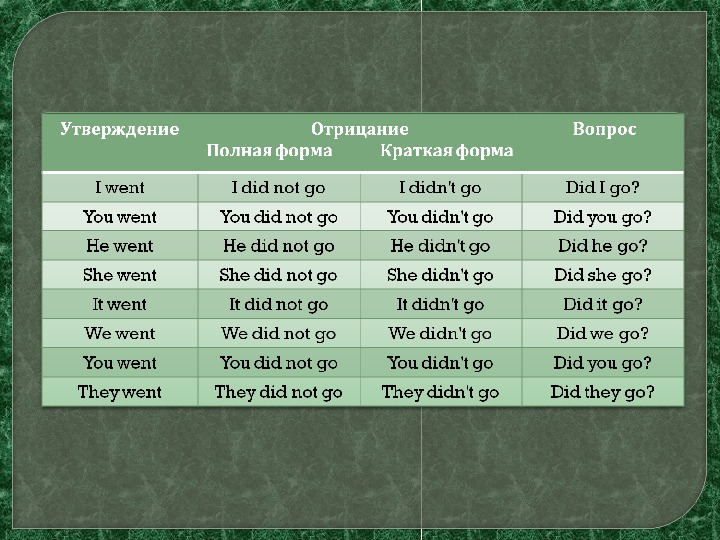
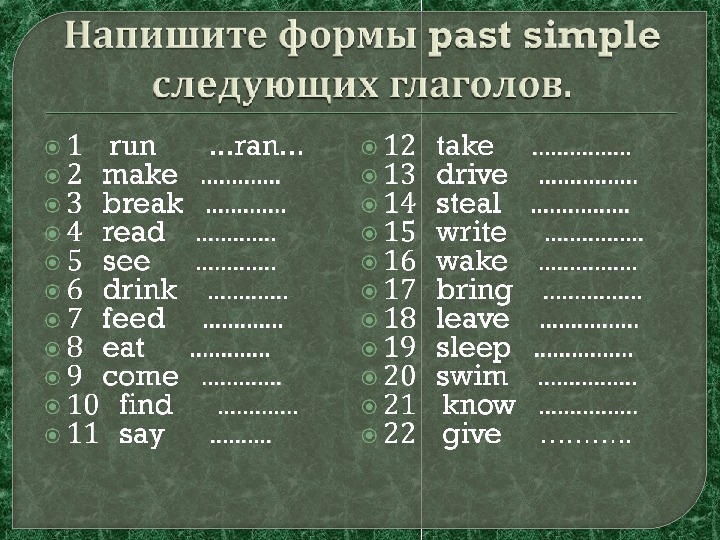
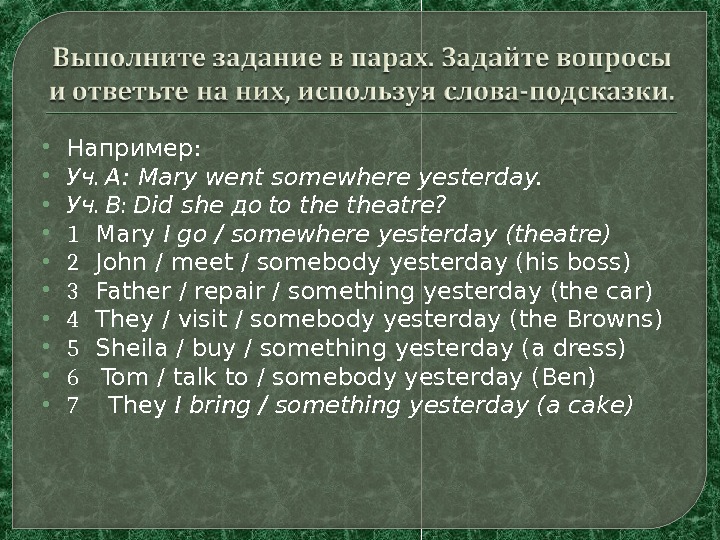
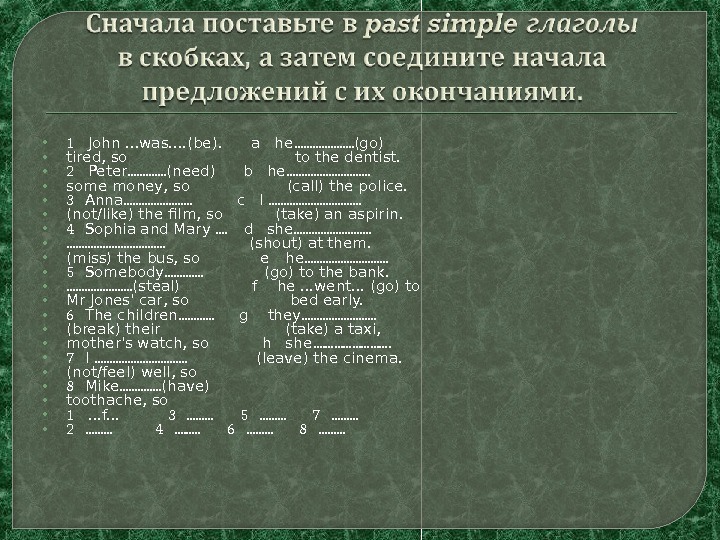
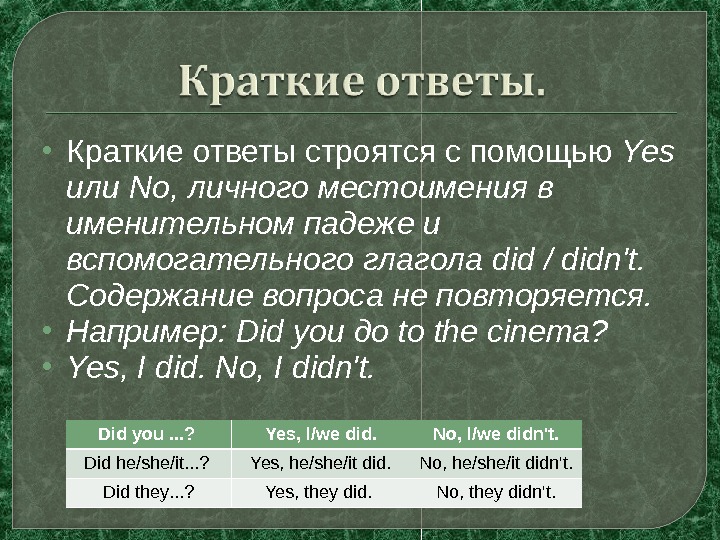
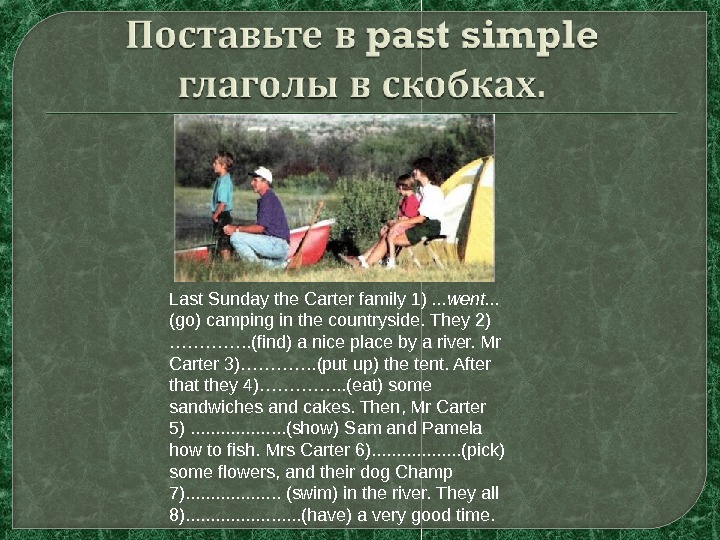
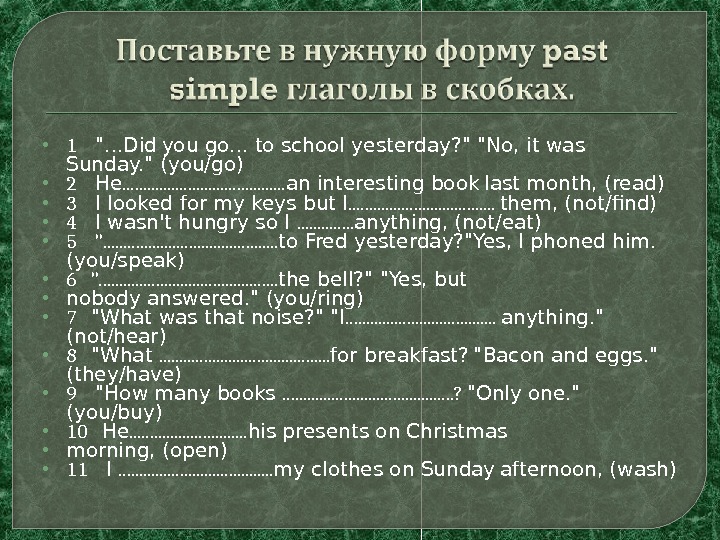
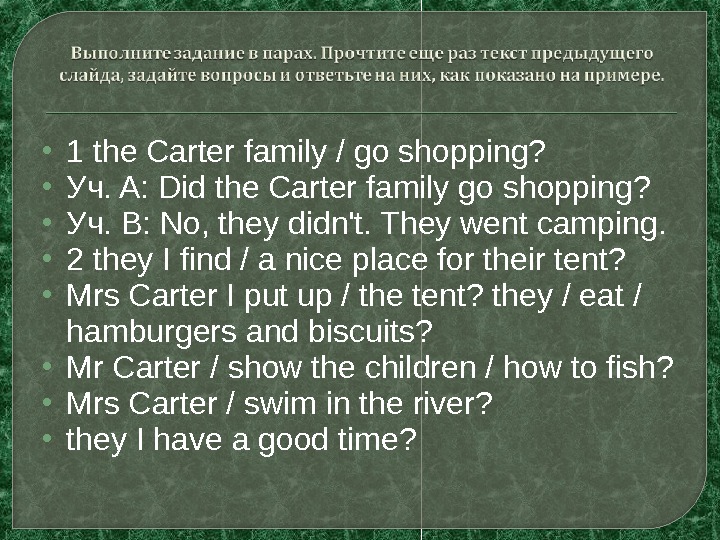
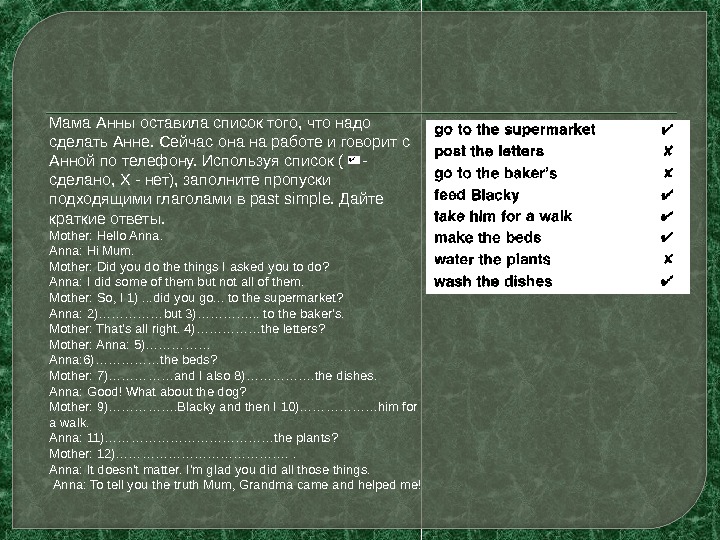
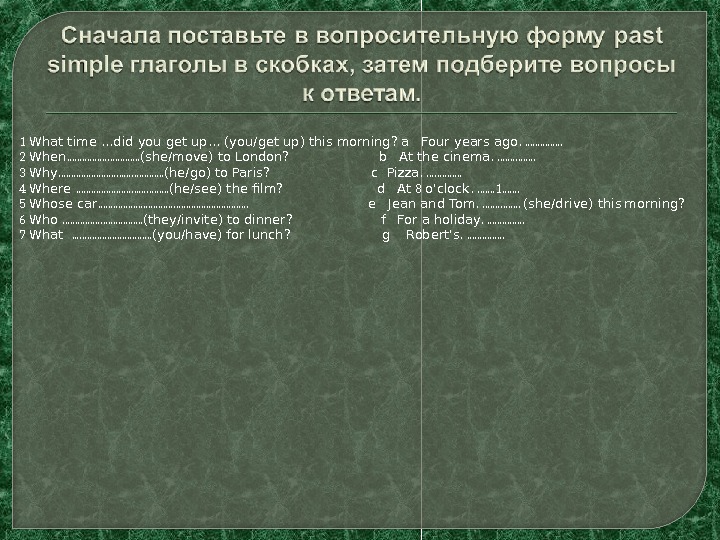
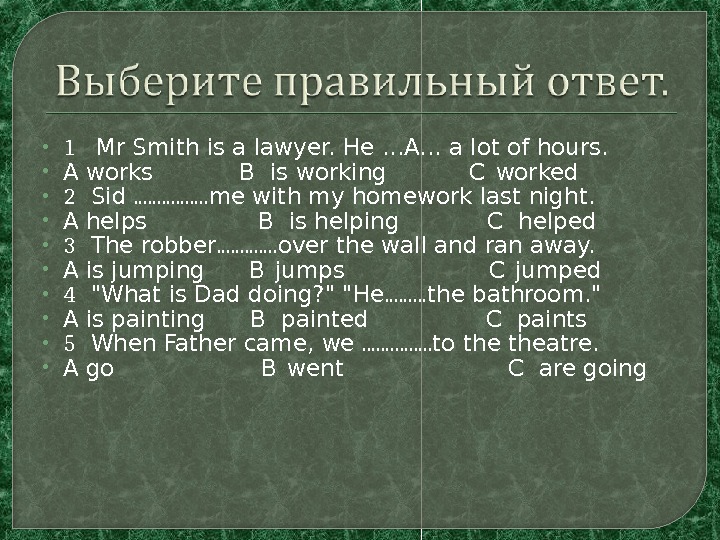
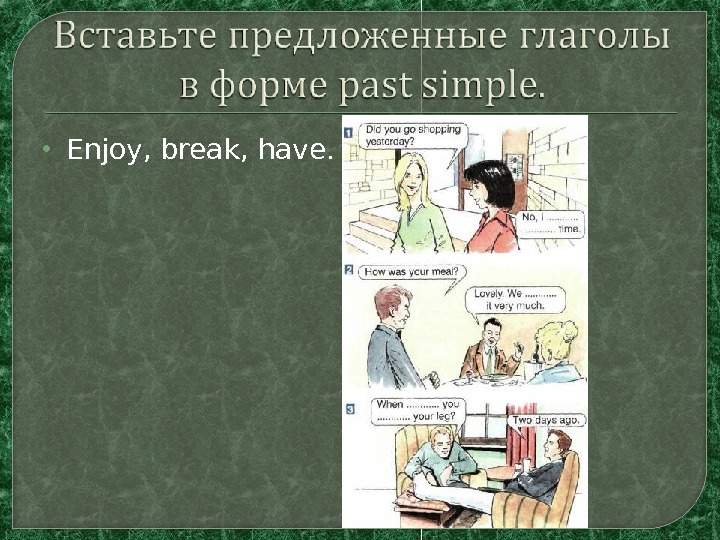
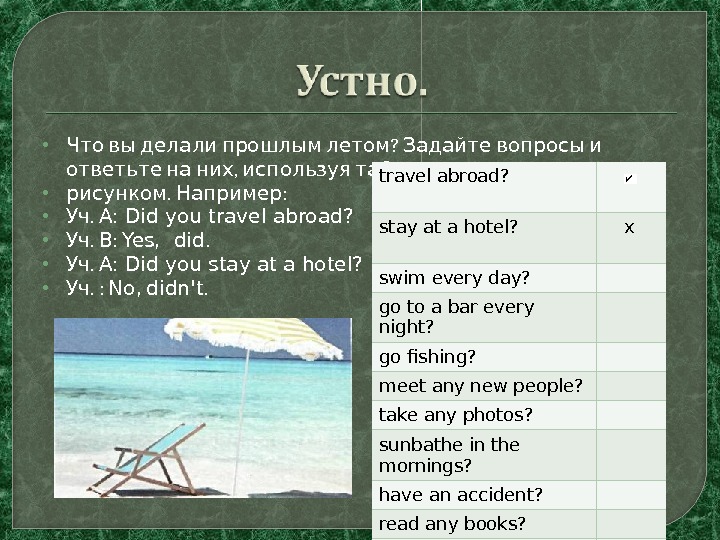
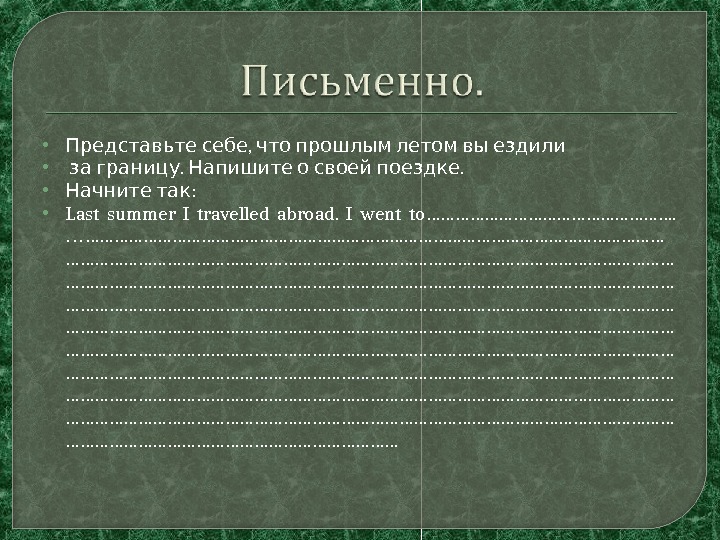
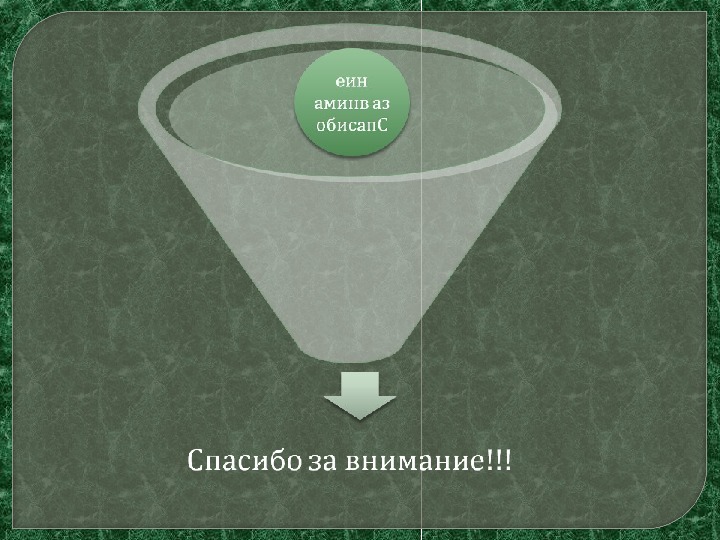
past_simple_regular_irregular_verbs.ppt
- Размер: 2.1 Mегабайта
- Количество слайдов: 23
Описание презентации Past simple : употребляется для выражения по слайдам

 Past simple : употребляется для выражения , действий произошедших в , ( прошлом в определенное указанное время то есть нам известно когда и ) . часто где эти действия произошли They got married 15 years ago. (When did they get married? 15 years ago. )Past simple : употребляется для выражения , действий произошедших в прошлом в определенное указанное , ( ) время то есть нам известно когда и часто где эти действия. произошли , . повторяющихся в прошлом действии которые более не происходят В этом случае могут использоваться наречия частоты (always, often, usually . . ). и т д My f ather often took me to the playground when I was little. , действий следовавших одно за другим в. прошлом
Past simple : употребляется для выражения , действий произошедших в , ( прошлом в определенное указанное время то есть нам известно когда и ) . часто где эти действия произошли They got married 15 years ago. (When did they get married? 15 years ago. )Past simple : употребляется для выражения , действий произошедших в прошлом в определенное указанное , ( ) время то есть нам известно когда и часто где эти действия. произошли , . повторяющихся в прошлом действии которые более не происходят В этом случае могут использоваться наречия частоты (always, often, usually . . ). и т д My f ather often took me to the playground when I was little. , действий следовавших одно за другим в. прошлом
 Julie and her daughter didn’t stay at home last weekend. They went to a friend’s house in the mountains. They played in the snow and had a lot of fun.
Julie and her daughter didn’t stay at home last weekend. They went to a friend’s house in the mountains. They played in the snow and had a lot of fun.

 К глаголам, оканчивающимся на -е, прибавляется только -d. like — liked . В глаголах, оканчивающихся на согласную + у, опускается у и прибавляется -ied. study — studied Но к глаголам, оканчивающимся на гласную + у, прибавляется -ed. play — played, stay – stayed. В глаголах, оканчивающихся на ударный слог с кратким гласным между двумя согласными, конечная согласная буква удваивается и прибавляется — ed. stop — stopped Но visit — visited В глаголах, оканчивающихся на I, удваивается I и прибавляется -е d. travel — travelled, quarrel — quarrelled
К глаголам, оканчивающимся на -е, прибавляется только -d. like — liked . В глаголах, оканчивающихся на согласную + у, опускается у и прибавляется -ied. study — studied Но к глаголам, оканчивающимся на гласную + у, прибавляется -ed. play — played, stay – stayed. В глаголах, оканчивающихся на ударный слог с кратким гласным между двумя согласными, конечная согласная буква удваивается и прибавляется — ed. stop — stopped Но visit — visited В глаголах, оканчивающихся на I, удваивается I и прибавляется -е d. travel — travelled, quarrel — quarrelled
 laugh, tidy, travel, stay, plan, hate, cry, rob, pull, love, study, dance, kiss, drop, change, enjoy, try, live, prefer, cook, hurry -ed -d laughed — ied двойная согласная + ed
laugh, tidy, travel, stay, plan, hate, cry, rob, pull, love, study, dance, kiss, drop, change, enjoy, try, live, prefer, cook, hurry -ed -d laughed — ied двойная согласная + ed
 Окончание -ed : произносится как / id /, если глаголы оканчиваются на звуки /t / или / d /. wanted, mended / d /, если глаголы оканчиваются на : другие звуки closed, studied, loved, robbed.
Окончание -ed : произносится как / id /, если глаголы оканчиваются на звуки /t / или / d /. wanted, mended / d /, если глаголы оканчиваются на : другие звуки closed, studied, loved, robbed.
 Past simple неправильных глаголов образуется не путем прибавления -ed, . : — а другими способами Например до went, see— saw, drink—drank. Вопросы и отрицания с этими глаголами строятся с помощью вспомогательного глагола did / did not (didn’t) и корневой ( ) . основной формы смыслового глагола : Например Не went out — Did he go out? — He didn’t go out.
Past simple неправильных глаголов образуется не путем прибавления -ed, . : — а другими способами Например до went, see— saw, drink—drank. Вопросы и отрицания с этими глаголами строятся с помощью вспомогательного глагола did / did not (didn’t) и корневой ( ) . основной формы смыслового глагола : Например Не went out — Did he go out? — He didn’t go out.


 : Например . Уч A: Mary went somewhere yesterday. . : Уч В Did she до to theatre? 1 Mary I go / somewhere yesterday (theatre) 2 John / meet / somebody yesterday (his boss) 3 Father / repair / something yesterday (the car) 4 They / visit / somebody yesterday (the Browns) 5 Sheila / buy / something yesterday (a dress) 6 Tom / talk to / somebody yesterday (Ben) 7 They I bring / something yesterday (a cake)
: Например . Уч A: Mary went somewhere yesterday. . : Уч В Did she до to theatre? 1 Mary I go / somewhere yesterday (theatre) 2 John / meet / somebody yesterday (his boss) 3 Father / repair / something yesterday (the car) 4 They / visit / somebody yesterday (the Browns) 5 Sheila / buy / something yesterday (a dress) 6 Tom / talk to / somebody yesterday (Ben) 7 They I bring / something yesterday (a cake)
 1 John. . . was. . (be). a he. . . . . (go) tired, so to the dentist. 2 Peter. . . (need) b he. . . . some money, so (call) the police. 3 Anna. . . с I . . . . (not/like) the film, so (take) an aspirin. 4 Sophia and Mary . . d she. . . . (shout) at them. (miss) the bus, so e he. . . . 5 Somebody. . . (go) to the bank. . . (steal) f he. . . went. . . (go) to Mr Jones’ car, so bed early. 6 The children. . . g they. . . (break) their (take) a taxi, mother’s watch, so h she. . . 7 I . . . . (leave) the cinema. (not/feel) well, so 8 Mike. . . (have) toothache, so 1 . . . f. . . 3 . . 5 . . 7 . . 2 . . 4 . . 6 . . 8 . .
1 John. . . was. . (be). a he. . . . . (go) tired, so to the dentist. 2 Peter. . . (need) b he. . . . some money, so (call) the police. 3 Anna. . . с I . . . . (not/like) the film, so (take) an aspirin. 4 Sophia and Mary . . d she. . . . (shout) at them. (miss) the bus, so e he. . . . 5 Somebody. . . (go) to the bank. . . (steal) f he. . . went. . . (go) to Mr Jones’ car, so bed early. 6 The children. . . g they. . . (break) their (take) a taxi, mother’s watch, so h she. . . 7 I . . . . (leave) the cinema. (not/feel) well, so 8 Mike. . . (have) toothache, so 1 . . . f. . . 3 . . 5 . . 7 . . 2 . . 4 . . 6 . . 8 . .
 Краткие ответы строятся с помощью Yes или No, личного местоимения в именительном падеже и вспомогательного глагола did / didn’t. Содержание вопроса не повторяется. Например: Did you до to the cinema? Yes, I did. No, I didn’t. Did you . . . ? Yes, l/we did. No, l/we didn’t. Did he/she/it. . . ? Yes, he/she/it did. No, he/she/it didn’t. Did they. . . ? Yes, they did. No, they didn’t.
Краткие ответы строятся с помощью Yes или No, личного местоимения в именительном падеже и вспомогательного глагола did / didn’t. Содержание вопроса не повторяется. Например: Did you до to the cinema? Yes, I did. No, I didn’t. Did you . . . ? Yes, l/we did. No, l/we didn’t. Did he/she/it. . . ? Yes, he/she/it did. No, he/she/it didn’t. Did they. . . ? Yes, they did. No, they didn’t.
 Last Sunday the Carter family 1) . . . went. . . (go) camping in the countryside. They 2) …………. . (find) a nice place by a river. Mr Carter 3)…………. (put up) the tent. After that they 4)…………. . . (eat) some sandwiches and cakes. Then, Mr Carter 5). . . . . (show) Sam and Pamela how to fish. Mrs Carter 6). . . . (pick) some flowers, and their dog Champ 7). . . . . (swim) in the river. They all 8). . . (have) a very good time.
Last Sunday the Carter family 1) . . . went. . . (go) camping in the countryside. They 2) …………. . (find) a nice place by a river. Mr Carter 3)…………. (put up) the tent. After that they 4)…………. . . (eat) some sandwiches and cakes. Then, Mr Carter 5). . . . . (show) Sam and Pamela how to fish. Mrs Carter 6). . . . (pick) some flowers, and their dog Champ 7). . . . . (swim) in the river. They all 8). . . (have) a very good time.
 1 «. . . Did you go. . . to school yesterday? » «No, it was Sunday. » (you/go) 2 He. . . . . an interesting book last month, (read) 3 I looked for my keys but I. . . . . them, (not/find) 4 I wasn’t hungry so I . . . anything, (not/eat) 5 «. . . to Fred yesterday? «Yes, I phoned him. (you/speak) 6 «. . . the bell? » «Yes, but nobody answered. » (you/ring) 7 «What was that noise? » «I. . . . . anything. » (not/hear) 8 «What . . for breakfast? «Bacon and eggs. » (they/have) 9 «How many books . . ? «Only one. » (you/buy) 10 He. . . . his presents on Christmas morning, (open) 11 I . . my clothes on Sunday afternoon, (wash)
1 «. . . Did you go. . . to school yesterday? » «No, it was Sunday. » (you/go) 2 He. . . . . an interesting book last month, (read) 3 I looked for my keys but I. . . . . them, (not/find) 4 I wasn’t hungry so I . . . anything, (not/eat) 5 «. . . to Fred yesterday? «Yes, I phoned him. (you/speak) 6 «. . . the bell? » «Yes, but nobody answered. » (you/ring) 7 «What was that noise? » «I. . . . . anything. » (not/hear) 8 «What . . for breakfast? «Bacon and eggs. » (they/have) 9 «How many books . . ? «Only one. » (you/buy) 10 He. . . . his presents on Christmas morning, (open) 11 I . . my clothes on Sunday afternoon, (wash)
 1 the Carter family / go shopping? Уч. A: Did the Carter family go shopping? Уч. В : No, they didn’t. They went camping. 2 they I find / a nice place for their tent? Mrs Carter I put up / the tent? they / eat / hamburgers and biscuits? Mr Carter / show the children / how to fish? Mrs Carter / swim in the river? they I have a good time?
1 the Carter family / go shopping? Уч. A: Did the Carter family go shopping? Уч. В : No, they didn’t. They went camping. 2 they I find / a nice place for their tent? Mrs Carter I put up / the tent? they / eat / hamburgers and biscuits? Mr Carter / show the children / how to fish? Mrs Carter / swim in the river? they I have a good time?
 Мама Анны оставила список того, что надо сделать Анне. Сейчас она на работе и говорит с Анной по телефону. Используя список ( — сделано, X — нет), заполните пропуски подходящими глаголами в past simple. Дайте краткие ответы. Mother: Hello Anna: Hi Mum. Mother: Did you do the things I asked you to do? Anna: I did some of them but not all of them. Mother: So, I 1). . . did you go. . . to the supermarket? Anna: 2)……………but 3)…………. . . to the baker’s. Mother: That’s all right. 4)……………the letters? Mother: Anna: 5)…………… Anna: 6)……………the beds? Mother: 7)……………and I also 8)……………. the dishes. Anna: Good! What about the dog? Mother: 9)……………. Blacky and then I 10)………………him for a walk. Anna: 11)…………………the plants? Mother: 12)…………………. . Anna: It doesn’t matter. I’m glad you did all those things. Anna: To tell you the truth Mum, Grandma came and helped me!
Мама Анны оставила список того, что надо сделать Анне. Сейчас она на работе и говорит с Анной по телефону. Используя список ( — сделано, X — нет), заполните пропуски подходящими глаголами в past simple. Дайте краткие ответы. Mother: Hello Anna: Hi Mum. Mother: Did you do the things I asked you to do? Anna: I did some of them but not all of them. Mother: So, I 1). . . did you go. . . to the supermarket? Anna: 2)……………but 3)…………. . . to the baker’s. Mother: That’s all right. 4)……………the letters? Mother: Anna: 5)…………… Anna: 6)……………the beds? Mother: 7)……………and I also 8)……………. the dishes. Anna: Good! What about the dog? Mother: 9)……………. Blacky and then I 10)………………him for a walk. Anna: 11)…………………the plants? Mother: 12)…………………. . Anna: It doesn’t matter. I’m glad you did all those things. Anna: To tell you the truth Mum, Grandma came and helped me!
 1 What time. . . did you get up. . . (you/get up) this morning? a Four years ago. . . . 2 When. . . . (she/move) to London? b At the cinema. . . . 3 Why. . . . . (he/go) to Paris? с Pizza. . . . 4 Where . . (he/see) the film? d At 8 o’clock. . . . 1. . . . 5 Whose car. . . . e Jean and Tom. . . . (she/drive) this morning? 6 Who . . . . (they/invite) to dinner? f For a holiday. . . . 7 What . . . . (you/have) for lunch? g Robert’s. . . .
1 What time. . . did you get up. . . (you/get up) this morning? a Four years ago. . . . 2 When. . . . (she/move) to London? b At the cinema. . . . 3 Why. . . . . (he/go) to Paris? с Pizza. . . . 4 Where . . (he/see) the film? d At 8 o’clock. . . . 1. . . . 5 Whose car. . . . e Jean and Tom. . . . (she/drive) this morning? 6 Who . . . . (they/invite) to dinner? f For a holiday. . . . 7 What . . . . (you/have) for lunch? g Robert’s. . . .
 1 Mr Smith is a lawyer. He. . . A. . . a lot of hours. A works В is working С worked 2 Sid . . . . me with my homework last night. A helps В is helping С helped 3 The robber. . . over the wall and ran away. A is jumping В jumps С jumped 4 «What is Dad doing? » «He. . the bathroom. » A is painting В painted С paints 5 When Father came, we . . . . to theatre. A go В went С are going
1 Mr Smith is a lawyer. He. . . A. . . a lot of hours. A works В is working С worked 2 Sid . . . . me with my homework last night. A helps В is helping С helped 3 The robber. . . over the wall and ran away. A is jumping В jumps С jumped 4 «What is Dad doing? » «He. . the bathroom. » A is painting В painted С paints 5 When Father came, we . . . . to theatre. A go В went С are going
 Enjoy, break, have.
Enjoy, break, have.
 ? Что вы делали прошлым летом Задайте вопросы и , ответьте на них используя таблицу под . : рисунком Например . Уч A: Did you travel abroad? . : Уч В Yes, did. . Уч A: Did you stay at a hotel? . : Уч No, didn’t. travel abroad? stay at a hotel? х swim every day? go to a bar every night? go fishing? meet any new people? take any photos? sunbathe in the mornings? have an accident? read any books? collect any shells? watch the sun set?
? Что вы делали прошлым летом Задайте вопросы и , ответьте на них используя таблицу под . : рисунком Например . Уч A: Did you travel abroad? . : Уч В Yes, did. . Уч A: Did you stay at a hotel? . : Уч No, didn’t. travel abroad? stay at a hotel? х swim every day? go to a bar every night? go fishing? meet any new people? take any photos? sunbathe in the mornings? have an accident? read any books? collect any shells? watch the sun set?
 , Представьте себе что прошлым летом вы ездили . . за границу Напишите о своей поездке : Начните так Last summer I travelled abroad. I went to ………………………. … ……………………………………………………………………………………………………………… ……………………………………………………………………………………………………………… ………………………………………………………
, Представьте себе что прошлым летом вы ездили . . за границу Напишите о своей поездке : Начните так Last summer I travelled abroad. I went to ………………………. … ……………………………………………………………………………………………………………… ……………………………………………………………………………………………………………… ………………………………………………………


